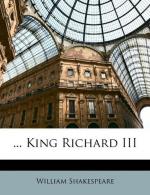|
This section contains 11,420 words (approx. 39 pages at 300 words per page) |

|
SOURCE: “Shakespeare's Halle of Mirrors: Play, Politics, and Psychology in Richard III,” in Shakespeare Studies: An Annual Gathering of Research, Criticism, and Reviews, Vol. 8, 1975, pp. 99-129.
In the following essay, Neill examines the psychological complexity of Richard's character.
Here the King is, in the first half of the tragedy, the mastermind of the Grand Mechanism, a demiurge of history.(1)
God in love with His own beauty frames a glass, to view it by reflection.(2)
Richard III is the most stridently theatrical of all of Shakespeare's plays. The superb histrionic insolence of Richard, his stagy relish in confidential soliloquy and aside, is matched by a self-conscious patterning of plot, spectacle, and language, as if Shakespeare's artistry were being flaunted like Richard's own. And the connection is insistently underlined by the use of stage metaphors: poet, actor, and protagonist unite in a Marlovian pageant of self-display.3 This ostentatious theatricality, while...
|
This section contains 11,420 words (approx. 39 pages at 300 words per page) |

|


